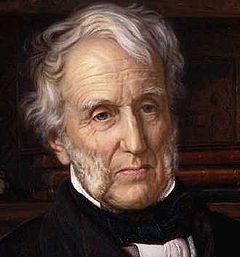Stephen Lushington (judge)
| Stephen Lushington | |
|---|---|

1862 portrait (detail) by William Holman Hunt
|
|
| Born | 14 January 1782 South Hill Park, Berkshire |
| Died |
19 January 1873 (aged 91) Ockham Park, Surrey |
| Resting place | Ockham, Surrey |
| Nationality | English |
| Education | Christ Church, Oxford, Inner Temple |
| Occupation | judge |
| Known for | Slavery abolitionist |
Stephen Lushington (14 January 1782 – 19 January 1873) was a British judge, Member of Parliament and a radical for the abolition of slavery and capital punishment.
Lushington was the second son of Sir Stephen Lushington, 1st Baronet (1744–1807), a member of parliament and Chairman of the British East India Company. He was educated at Eton College and Christ Church, Oxford, after which he was elected a fellow of All Souls.
He joined the Inner Temple and was called to the bar in 1806. In the same year, he entered Parliament as Whig member for Great Yarmouth, and he spoke in the Commons in favour of the bill to abolish the slave trade in February 1807, and remained a lifelong advocate of the anti-slavery cause. He was re-elected in 1808, but a few months later, after the defeat of a motion he had proposed to castigate the behaviour of Sir Home Popham, he resigned his seat and devoted his energies to his legal practice.
He returned to Parliament as the MP for Ilchester in 1820, and subsequently also represented Tregony, Winchelsea and Tower Hamlets. He continued to support all measures attempting to suppress slavery or the slave trade, and also proposed or attempted to propose motions to recognise the independence of South America from Spain (1820) and to abolish capital punishment (1840). He championed the cause of Jamaican anti-slavery activist Louis Celeste Lecesne, supported Catholic Emancipation and spoke in favour of repealing the civil disabilities which applied to Jews; he was also a strong supporter of Parliamentary reform, and advocated triennial parliaments and the secret ballot. He retired from Parliament in 1841.
...
Wikipedia
